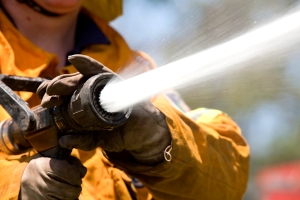Fires and the recycling industry
By Mike Ritchie, MRA Consulting Group
The waste and recycling industry is, sadly, becoming known for its large blazes. This is not to suggest that Australian recycling facilities are badly run. They are not. It is, however, a sector that is at risk from fires.

There isn’t good data on how many fires occur in recycling plants around Australia. A 2016 report for the Department of Environment concluded that “there is an urgent need for the collection and reporting of waste fire statistics in a standardised form” (their emphasis).
Ryan Fogelman of Fire Rover in the US reports that, for the 12 months from July 2016 to June 2017, there were 268 fires reported at recycling facilities in North America. This is likely a substantial understatement, because it only covers fires reported in news services.
A further article from 2016 reports that there are typically 250 waste fires in the United Kingdom each year, however the scale of these fires is increasing. The annual cost to fire and emergency services from waste fires is estimated at around £16 million per year.
The problem comes from many different sources
The focus of the conversation surrounding many fires is typically the storage of waste materials. Clearly, large stockpiles contribute to the intensity of a blaze once it starts. It’s an obvious fix in the eyes of a regulator, but not necessarily straightforward when a recycler is dealing with ebbs and flows of waste generation traded into global markets that can suddenly change as demonstrated by the GFC’s impact on recycling.
The industry is vulnerable to fires simply because of the nature of the materials handled. Incompatible wastes mixing cause spontaneous combustion, lithium batteries explode in shredders. Then there are fires starting from self-heating waste, arson and even falling embers from neighbouring fires or bushfires.
The problem can be solved
As an industry, we need to respond proactively, taking steps now to prepare and implement tight industry codes of practice. In my view, we should implement the following as a minimum:
- Mandate Fire Prevention Plans as is required in the UK for all new or re-permitted facilities. This enables site specific conditions to be taken into account. We should make these plans mandatory on all facilities, new and existing;
- Mandated sprinkler systems for facilities above a certain size;
- Limits on the storage of materials outside; and
- Mandatory stockpile limits.
We need to work with firefighters and regulators to craft these standards, establishing a national “Fire Protection” (or similar) Working Group of WMAA to coordinate our efforts. We should push for fire codes to become standard across Australia. It should be a level playing field between new and existing facilities, just as it should be between states.
It’s not good enough to have waste move to a cheaper facility simply because their fire protections are lower.
Government can support the sector in this transformation. The NSW “authorised amounts” is a good approach to stockpile limits. Allocating Waste Less, Recycle More type funding to help the industry develop fire plans would be an excellent way forward. I agree with Grant Musgrove at the Australian Council of Recyclers that landfill levy funds should be freed up to ensure that recycling facilities are adequately protected.
Where to next
We, as a waste and recycling industry, need to work together with governments, firefighters and regulators to develop an integrated response. The waste and recycling sector should be renowned for being safe, responsible and environmentally friendly. It’s too important to be seen as anything less.
As always, I welcome your feedback on this, or any other topic on ‘The Tipping Point’.
This article has been published by the following media outlets:





